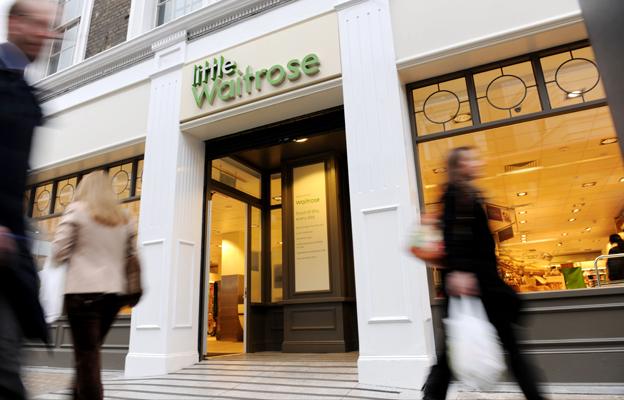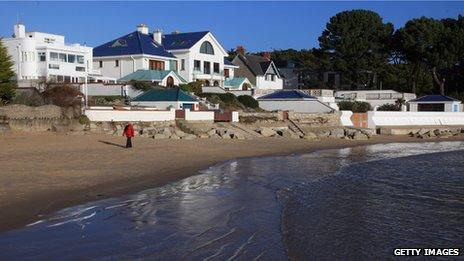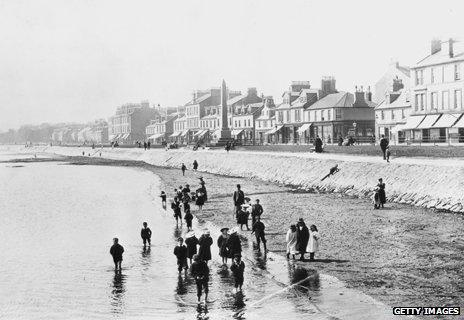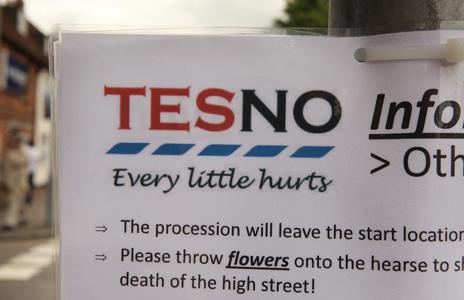The Waitrose snobbery/property price index
- Published

The 300th Waitrose has opened in Helensburgh, near Glasgow. Is getting a Waitrose in your neighbourhood the ultimate badge of endorsement?
A lot of people apparently believe in something called the "Waitrose effect".
Take the opening of a branch in the Gloucestershire town of Chipping Sodbury this summer. "Chipping Sodbury property price rise is attributed to the building of a new Waitrose store," ran a local paper's headline, external. A Sunday Times article had identified the town as a potential property hot spot, adding that "the opening of Britain's most middle-class supermarket can only push values higher".
Citing the "Waitrose effect", one local firm of solicitors announced on its website: "Chipping Sodbury will become aspirational with opening of new Waitrose store." It offered a special "Waitrose conveyancing" discount ahead of the store's opening.
The effect has been studied, by estate agents at least. Savills's research indicated that house prices in areas where there was a store were typically 25% higher than the UK average. In London, there was a 50% premium in Waitrose postcodes.
A recent spat in Dorset's exclusive Sandbanks peninsula pitted a number of locals against Tesco, which is transforming a former pub into a store. "We want Waitrose not Tesco! Howls of protest from Sandbanks' millionaires over 'downmarket' plans to convert pub," ran the Daily's Mail's headline.

Sandbanks Peninsula is famed for its high property prices
Waitrose acknowledges that the hype exists.
"There's been a lot of anecdotal talk from estate agents commenting on increased demand and interests following the news that a Waitrose is opening in an area," says Nigel Keen, Waitrose director of development.
"For example, with the Waitrose opening in Helensburgh, we've been told that an Indian restaurant, with a branch already near one of our Glasgow shops has decided to invest here and an existing delicatessen is opening a restaurant in the town on the back of us coming."
The location is a long way from Acton, London, where the original Waite, Rose & Taylor opened in 1904, and even further from the leafy, Home County suburbs where the retailer gained its reputation as grocer to the middle classes. Waitrose now has a presence is the South East of England, the North, Wales, the South West and Scotland and says it "appeals to broad and varied groups of people".
Ian Bradberry, branch manager for Sharman Quinney estate agents in Oundle, Northants, says he has definitely seen the "Waitrose effect" in the town where a branch opened recently.
"There has definitely been more interest in properties around where it is located. We do expect that in time this will result in an increase in prices. The 'Waitrose effect' is particularly prevalent in a small market town like Oundle where older buyers look for properties within walking distance of the local shops and supermarkets."
But like the chicken and the egg, is it a case of Waitrose following affluent customers, or does the opening of a branch make an area more desirable? In the absence of evidence, anecdote can often be king.
"Waitrose, like other brands, invests time and money opening in the location that matches their profile," says Paul Langston, consulting partner of location strategy at market research analysts CACI.

The latest branch of Waitrose opens in Helensburgh - pictured here in 1900
"No-one has ever done the research to isolate what is the cause and what's the effect. It is difficult to prove that a town has become more desirable because of a Waitrose. There have been some businesses that have come to me and said they want to be somewhere if a Waitrose is going to open. There is a slight snowball effect."
Some local authorities and councils see the opening of a Waitrose as a statement that this must be a pleasant place to live, says Langston.
"You don't tend to get that when some of the other retailers move in."
But do people really base their house-buying decisions on their proximity to a £3.20 rosemary and potato loaf?
It's a bit of a "virtuous circle", says Harry Wallop, author of Consumer: How Shopping Fed the Class System. Waitrose moves into an affluent area, potential buyers like the fact that it's a "badge of a nice middle class area, one in which you are bound to find excellent schools and good coffee shops".
Wallop, who has described supermarkets as "crucibles of snobbery", describes the UK's supermarket system as "the most sophisticated in the world".
"In France, for example, there isn't the same snob value as there isn't a Waitrose. We all know that here [in the UK], where we shop and the quality of our Bag For Life says a lot about us.
"There is a body of consumers who would love to have a Waitrose on their doorstep. There is this snobbishness where people are prepared to man the barricades against a Tesco but if it's a Waitrose, a fair amount of them will change their mind."

Many estate agents find it hard to believe that a particular brand of supermarket could really have any significant effect. At Rook Matthews Sayer in Hexham, Northumberland, where a Waitrose branch has been operating for about five years, a senior sales negotiator, who did not wish to be named, says she thought it was "just a myth".
After all, estate agents also promote proximity to a Sainsbury's or a Tesco.
But what about Helensburgh?
Paula Bailey, manager of Allen & Harris estate agents in the town has got her feet firmly on the ground. She doesn't expect the opening of the 300th Waitrose to push up the house prices any time soon.
Follow @BBCNewsMagazine, external on Twitter and on Facebook, external